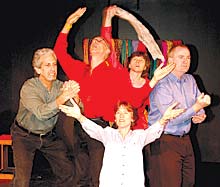Imagine a theater company that’s thrown its script out the window: Ensemble members hear a story for the first time and act on impulse to create a show right before your eyes. For most companies, this kind of challenge would result in chaos. But the Asheville Playback Theatre welcomes it.

Breaking the standards of traditional theater, Playback is an improvisational ensemble committed to creating spontaneous theater through audience participation. Playback depends on members of the audience to step up and share a story. From there, actors in the ensemble are assigned specific roles. Only moments later, the story that was just shared will be acted out.
“Playback is a unique kind of theater in that audience members become the storytellers,” explains Deborah Scott, the company’s creative director. “It takes true-life stories and shines a light on them through the creative process. This light connects us with others and with a larger community. The audience is just as important as the performers: They hold the space and provide the stories.”
Preparing for this kind of performance is a skill that Playback has been perfecting since its founding in 1995. Such an unusual performance format calls for equally unusual rehearsal methods, which include company members sharing their stories with each other.
“[Sharing] personal stories is a technique that places trust at the center of the ensemble,” says Scott. “We work towards honoring real, individual stories. It’s a rich vein to mine.”
The company is in its 13th season in Asheville, which includes 10 performances arranged around specific themes. These range from stories with a large scope, such as Human Rights: Stories that Uncover Our Hearts to the more intimate theme of Truth and Secrets. And since each performance depends on stories contributed by members of the audience, Playback is virtually assured of a constant supply of fresh topics from across the spectrum of human experience.
“Usually, when people hear ‘improv theater’ they think comedy,” notes Mountaine Jonas, an actor, teacher and musician who works with Playback. He explains that, in keeping with that spontaneous spirit, performances include live, improvised music that reflects the emotional content of the stories. “In our ensemble, we work with many contrasting feelings; we cover the experiences of life, reflections of a larger picture. Our intention is to create truly spontaneous theater, and it’s exciting because you never know what’s coming next.”
Another part of what makes the Playback format work is the lack of many of the barriers typically associated with dramatic theater. As Managing Director Raphael Peter explains, “The house lights will be on for the whole performance. The actors stand before the audience as real people: people who ask questions, people who fumble.”
The ideas behind Playback Theatre began with the work of Jonathan Fox and Jo Salas, two New York-based improv actors who began experimenting with the form in the mid-1970s. The idea spread rapidly, and groups can now be found in 35 countries across six continents. But a more surprising fact may be the kinds of places where such groups can be found. Playback has found receptive audiences in schools, retirement homes, festivals, business conferences and prisons around the world.
“Every culture has a history of storytelling, oral traditions and forms of sharing,” says Jonas. “This form of theater brings that to the stage. It has also been used in trouble spots for conflict resolution on a grassroots level.”
Asheville Playback’s performance on Sunday, Nov. 18, focuses on a single theme that is part of a greater effort. Joining with other Playback companies across the globe, the local group will present a performance based on the theme of justice with Human Rights: Stories that Uncover Our Hearts. Peter says that it is the third year the Asheville troupe has participated in the international event.
Although the scope is immense, Peter explains that the basic mechanism behind the Playback format is its local connection. “We are interested in seeing what’s out there, in hearing community concerns and in participating in those concerns,” he says.
With a team of 18 local actors eagerly anticipating an exciting and busy season, it’s easy to see why this season may be one of Asheville Playback’s best. In a town known for a high turnover rate in theater companies, the troupe has enjoyed remarkable longevity. But why? What is it about the Playback format that keeps audiences coming back for more?
“The value in Playback is that it is affirming,” says Jonas. “A storyteller has the experience of seeing their story being deeply told. They have the experience of being heard by people who care.”
Further, Jonas notes that the ensemble encourages open-mindedness in their audiences. After all, when there is no predetermined story to tell, anything can happen. His advice: “Be ready for anything!”
who: Asheville Playback Theatre presents Human Rights: Stories that Uncover Our Hearts
what: Real stories made into improv theater
where: NC Stage Company (15 Stage Lane)
when: Sunday, Nov. 18 (7 p.m. $10, although no one will be turned away for lack of funds. 670-5881)



Before you comment
The comments section is here to provide a platform for civil dialogue on the issues we face together as a local community. Xpress is committed to offering this platform for all voices, but when the tone of the discussion gets nasty or strays off topic, we believe many people choose not to participate. Xpress editors are determined to moderate comments to ensure a constructive interchange is maintained. All comments judged not to be in keeping with the spirit of civil discourse will be removed and repeat violators will be banned. See here for our terms of service. Thank you for being part of this effort to promote respectful discussion.